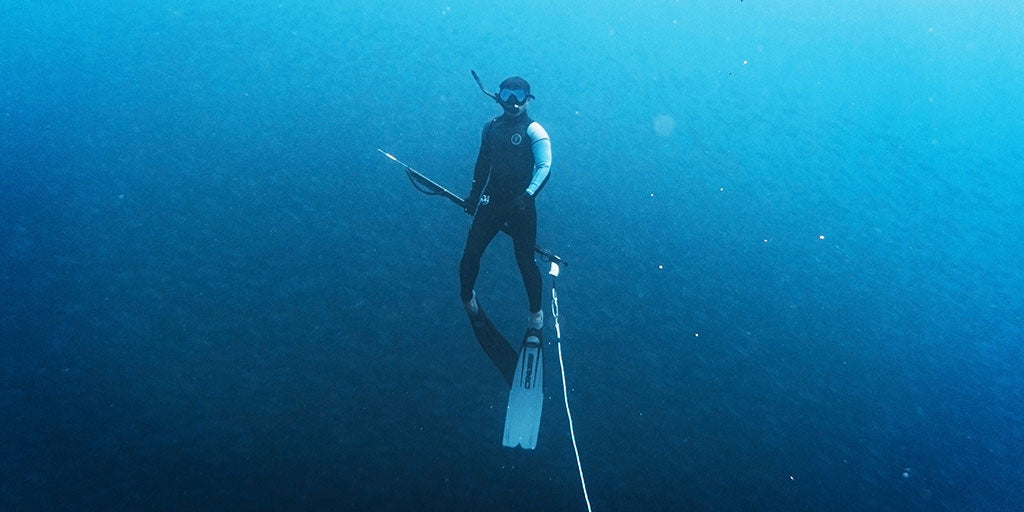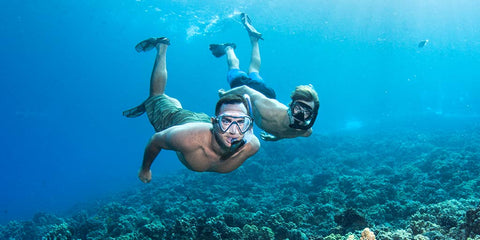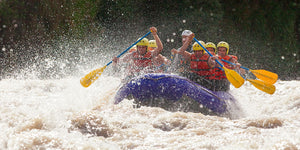4 Frequently Asked Questions About Spearfishing

When you think of underwater activities, the usual things that pop into mind are snorkeling and scuba diving. But there is another pastime that many people often overlook when they are looking for a way to explore and enjoy the ocean: spearfishing.
What Is Spearfishing?
The basics of spearfishing are simple: you use a sharp spear attached to an elastic or compressed air powered gun in order to hunt fish. After that, the rest is pretty self-explanatory. You find a body of water with some fish you are looking to catch and have at it.
Spearfishing has a long history in many different cultures. The earliest civilizations would use sharpened wood sticks to stick fish from above the water in rivers, streams and lakes. Modern spearfishing was really popularized in the 1920s in the Mediterranean.
(This would eventually lead to the development of contemporary diving masks, fins and snorkels.)
There are a few different variations of spearfishing to choose from, though. Free-diving or snorkeling are popular forms of the activity that require very little investment other than picking up some standard snorkeling equipment and basic spearfishing gear.
This is a great way to get a feel for the sport without having to commit heavily to a ton of equipment or overwhelm yourself with harder stuff like scuba spearfishing.

What Is Scuba Spearfishing?
Scuba spearfishing is a little more expensive of a hobby to get into. If you already have some scuba gear lying around, then you don’t need to worry too much about the initial investment or learning curve.
Having a solid background in scuba diving means you don’t need to learn two skills and can focus solely only on getting a hang of spearfishing, which is a hard enough task to learn on its own. Here are a few tips to get you started:
- Make sure you have the right equipment for the job. Do some research into the best practices for your specific game.
- Practice shooting your spear before you go spearfishing. Loading the spear and toiling around in the water is taxing, so having a good idea of what to do before you arrive will help tremendously with your results.
- Make smooth movements. Otherwise, the noise you create will probably end up scaring away the fish you are hunting.
If you don’t know how to scuba dive, this guide is a great place to start. It handles some of the basics to get you in the water and a few pro-tips that will help give you an edge.
But it is absolutely vital to make sure you are properly certified in scuba diving before you make any attempts.
Is Spearfishing Dangerous?
If you take the proper precautions and do your due diligence, spearfishing can be a safe and exciting pastime with very minimal risk. But you should always be aware of your surroundings and keep a keen eye on the conditions just to be safe.
Look up local regulations and conditions before you dive. This will minimize the likelihood of something taking you by surprise. You’ll likely also learn about local threats to look out for in your location.
Read the instructions for your gun and understand how to operate it and your scuba or snorkeling gear well before actually diving into the water.
Is Spearfishing Hard?
It is physically exhausting to snorkel, scuba dive or free dive. When you add the extra layer of work that comes with operating a speargun, you are definitely in for a challenging activity.
Once you get the hang of it though, spearfishing is like any other hobby. It just takes practice to get going. The more you do it, the better you’ll get. Hardcore enthusiasts call this process “getting a feel for your shot.”
Where you spearfish generally makes a difference in how difficult your experience is as well. There are four main types of spearfishing: shore diving, boat diving, blue water hunting and freshwater hunting.
Shore diving and freshwater are where most beginners tend to get their start and hone their skills since there is generally less risk there than blue water (open ocean) and boat spearfishing.
It’s a skill you’ll need to practice, but once you do, you will be able to take part in one of the oldest and most fun hobbies that are out there.
- Watersports Staff









Comments 0